List of non-extant papal tombs
This is a list of non-extant papal tombs, which includes tombs not included on the list of extant papal tombs. Information about these tombs is generally incomplete and uncertain.
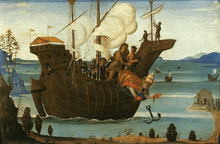
Chronologically, the main locations of destroyed or unknown papal tombs have been: the obscure tombs of the first two centuries of popes near Saint Peter, the repeated waves of translations from the Catacombs of Rome, the demolition of the papal tombs in Old St. Peter's Basilica, and the 1306 and 1361 fires in the Archbasilica of Saint John Lateran.
Papal tombs have also been destroyed by other instances of fire, remodeling, and war (most recently, World War II). Others are unknown due to creative or geographically remote methods of martyrdom, or—in the case of Pope Clement I—both. Burial in churches outside the Aurelian Walls of Rome (Italian: fuori le Mura)—in the basilicas of Paul or Lorenzo—have not generally survived.
Main locations
The main locations of destroyed or lost papal tombs include:
- Saint Peter's tomb, around which the following popes were traditionally believed to have been buried: Pope Linus, Pope Anacletus, Pope Evaristus. Pope Telesphorus, Pope Hyginus, Pope Pius I, Pope Anicetus (later transferred to the Catacomb of Callixtus), Pope Victor I.[1] Epigraphic evidence exists only for Linus, with the discovery of a burial slab marked "Linus" in 1615; however, the slab is broken such that it could have once read "Aquilinius" or "Anullinus".[2]
- The Catacombs of Rome, specifically the Catacomb of Callixtus, the Catacomb of Priscilla (and San Silvestro in Capite, built over the catacomb), the Catacomb of Balbina, the Catacomb of Calepodius, the Catacomb of Pontian, and the Catacomb of Felicitas, which were emptied by repeated translations by the ninth century[3]
- Papal tombs in Old St. Peter's Basilica, which once numbered over 100 papal tombs, nearly all of which were destroyed during the sixteenth/seventeenth century demolition[4]
- Archbasilica of Saint John Lateran, where over a dozen tombs were destroyed in two fires (1308 and 1361)[5]
Other destroyed or unknown tombs
1st century
| Pontificate | Portrait | Common English name | Tomb | Sculptor | Location | Notes |
|---|---|---|---|---|---|---|
| 88/92–97/101 | 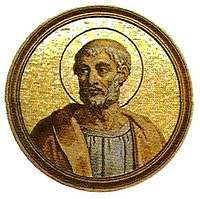 |
Clement I Saint Clement |
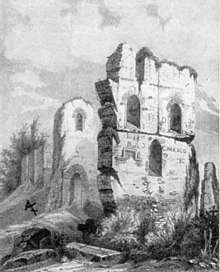 |
According to doctrine, translated to the Church of the Tithes (Kiev)[6] | According to doctrine thrown into the Black Sea near Crimea, translated to the Church of the Holy Apostles, then Basilica di San Clemente, then the Church of the Tithes.[6] |
2nd century
| Pontificate | Portrait | Common English name | Tomb | Sculptor | Location | Notes |
|---|---|---|---|---|---|---|
| 105/107–115/116 | 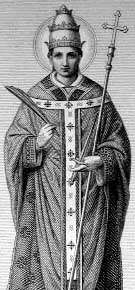 |
Alexander I Saint Alexander |
Competing claims (involving translation):[7]
|
|||
| 115/116–125 |  |
Sixtus I Saint Sixtus |
Competing claims (involving translation and a finger):[8]
|
|||
| 174/175–189 | 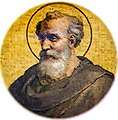 |
Eleuterus Saint Eleutherus |
Competing claims:[9]
|
5th century
| Pontificate | Portrait | Common English name | Tomb | Sculptor | Location | Notes |
|---|---|---|---|---|---|---|
| 31 July 432–March/August 440 | Sixtus III Saint Sixtus |
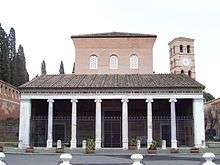 |
San Lorenzo fuori le Mura[10] | Then called San Lorenzo al Verano; sarcophagus destroyed, possibly in 1943[10] | ||
| 19 November 461 - 29 February 468 | .jpg) |
Hilarius Saint Hilarius |
 |
San Lorenzo fuori le Mura, crypt[11] | Then called San Lorenzo al Verano | |
| 13 March 483 - 1 March 492 | 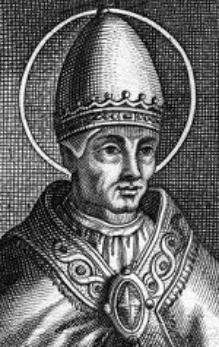 |
Felix III (Felix II) Saint Felix |
Either San Paolo fuori le Mura or the crypt of Santissima Concenzione near Piazza Barberini[12] |
6th century
| Pontificate | Portrait | Common English name | Tomb | Sculptor | Location | Notes |
|---|---|---|---|---|---|---|
| 1 June 536 - 11 November 537 |  |
Silverius Saint Silverius |
 |
Palmaria[13] | Non-contemporary shrine extant on Ponza Island[14] | |
| 29 March 537 - 7 June 555 |  |
Vigilius | Either San Marcello on the Via Salaria (Oxford Dictionary of Popes) or San Silvestre over the Catacomb of Priscilla on the Via Salaria (Catholic Encyclopedia)[15] |
7th century
| Pontificate | Portrait | Common English name | Tomb | Sculptor | Location | Notes |
|---|---|---|---|---|---|---|
| July 649 - 16 September 655 | 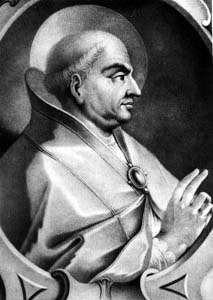 |
Martin I Saint Martin |
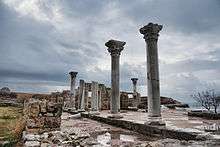 |
Church of our Lady (Blachdernæ), near Chersonesus | Possibly buried in Archbasilica of St. John Lateran |
9th century
| Pontificate | Portrait | Common English name | Tomb | Sculptor | Location | Notes |
|---|---|---|---|---|---|---|
| 25 January 817 - 11 February 824 | 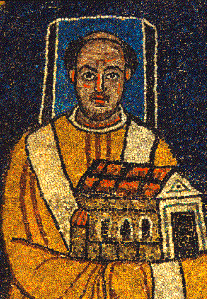 |
Paschal I Saint Paschal |
Unknown, but likely destroyed | Alleged to have been buried in the chapel of St. Zeno of Santa Prassade (disproved by modern research); possibly buried under the altar of the oratory of Saints Processus and Martiniano and lost when the oratory was moved in 1548 or 1605.[16] |
10th century
| Pontificate | Portrait | Common English name | Tomb | Sculptor | Location | Notes |
|---|---|---|---|---|---|---|
| July 903–September 903 |  |
Leo V | Unknown but destroyed | Either cremated and thrown in the Tiber, buried (and thus destroyed) in Old Saint Peter's, or buried whole in Archbasilica of Saint John Lateran[17] | ||
| 1 October 965 - 6 September 972 | John XIII | Basilica of Saint Paul Outside the Walls | Destroyed[18] |
11th century
| Pontificate | Portrait | Common English name | Tomb | Sculptor | Location | Notes |
|---|---|---|---|---|---|---|
| June 1003–December 1003 |  |
John XVII | Unknown but destroyed | Either San Paolo fuori le Mura, Archbasilica of Saint John Lateran or Santa Sabina[19] | ||
| 25 December 1003–July 1009 |  |
John XVIII | Unknown but destroyed | Either San Paolo fuori le Mura or Archbasilica of Saint John Lateran[20] | ||
| 1032–1044 | 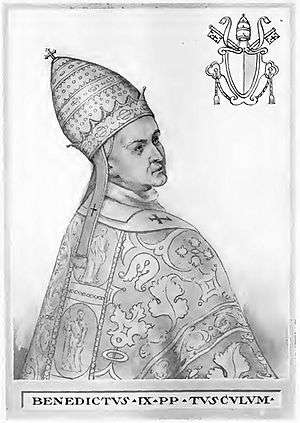 |
Benedict IX | 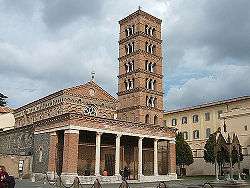 |
Abbey of Grottaferrata | Discovered on March 4, 1739; destroyed during World War II[21] | |
| 1045 |  |
Sylvester III | Unknown[22] | |||
| 13 April 1055 – 28 July 1057 |  |
Victor II | Santa Maria Rotunda (Ravenna) | Destroyed; claimed reburied in San Reparata (Florence) unsupported by evidence[23] | ||
| 2 August 1057 – 29 March 1058 |  |
Stephen IX, O.S.B. | Santa Reparata (Florence) | Tomb discovered in 1357 during the laying of the foundation for the new Duomo[23] | ||
| 6 December 1058 – 27 July 1061 |  |
Nicholas II | Santa Reparata (Florence) | Possibly reburied in the outer left aisle of St. Peter's; no remains of tomb in either today[23] | ||
| 30 September 1061 – 21 April 1073 |  |
Alexander II | Unknown but lost | Either Archbasilica of Saint John Lateran or St. Peter's[23] |
12th century
| Pontificate | Portrait | Common English name | Tomb | Sculptor | Location | Notes |
|---|---|---|---|---|---|---|
| 21 October 1187 – 17 December 1187 | 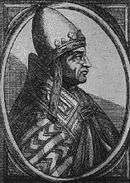 |
Gregory VIII, Can. Reg. | Pisa Cathedral, Chapel of Our Lady | Destroyed in the fire of 1600;[24] ordered the desecration of the tomb of Antipope Victor IV in Lucca on his way to Pisa, where he died |
13th century
| Pontificate | Portrait | Common English name | Tomb | Sculptor | Location | Notes |
|---|---|---|---|---|---|---|
| 18 July 1216 – 18 March 1227 | _-_Honorius_III_by_Leandro_Bassano.jpg) |
Honorius III | 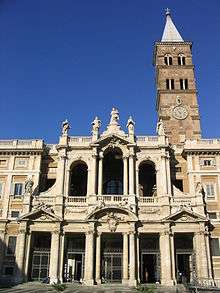 |
Basilica di Santa Maria Maggiore | No longer extant[25] | |
| 12 December 1254 – 25 May 1261 | 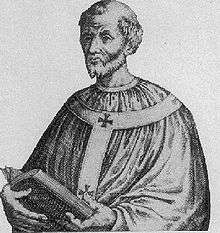 |
Alexander IV | 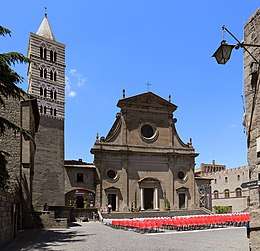 |
Viterbo Cathedral | Destroyed in 1490;[26] no longer extant[27] |
Notes
- Reardon, 2004, pp. 23-26.
- Reardon, 2004, p. 23.
- Reardon, 2004, pp. 10-11.
- Reardon, 2004, pp. 272-277.
- Reardon, 2004, pp. 70-109.
- Reardon, 2004, pp. 23–24.
- Reardon, 2004, p. 24.
- Reardon, 2004, pp. 24–25.
- Reardon, 2005, p. 26.
- Reardon, 2004, p. 40.
- Reardon, 2004, p. 41.
- Reardon, 2004, 41–42.
- Reardon, 2004, p. 44.
- Reardon, 2004, p. 270.
- Reardon, 2004, p. 45.
- Reardon, 2004, p. 61.
- Reardon, 2004, p. 69.
- Reardon, 2004, p. 73.
- Reardon, 2004, p. 79.
- Reardon, 2004, p. 80.
- Reardon, 2004, p. 81.
- Reardon, 2004, p. 82.
- Reardon, 2004, p. 85.
- Reardon, 2004, p. 98.
- Reardon, 2004, p. 100.
- Reardon, 2004, p. 103.
- Frothingham, A. L., Jr. (1891). "Notes on Roman Artists of the Middle Ages. III. Two Tombs of the Popes at Viterbo by Vassallectus and Petrus Oderisi". The American Journal of Archaeology and of the History of the Fine Arts, 7(1/2): 38.
References
- Reardon, Wendy J. 2004. The Deaths of the Popes. Macfarland & Company, Inc. ISBN 0-7864-1527-4